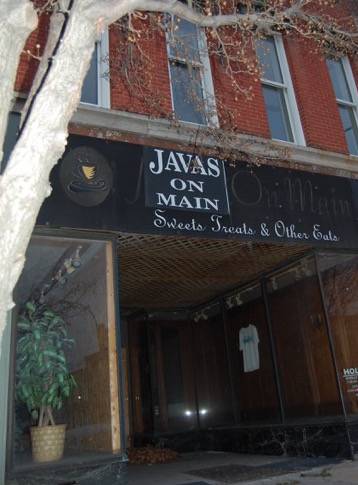
The investment group Le Roy New York, LLC, is hoping its plans to renovate 24 Main St. will move forward next year.
A group of Le Roy investors is hoping their efforts to renovate 24 Main St. kicks into high gear in the new year.
The Le Roy Board of Education in January will consider offering tax breaks for projects like the one proposed for 24 Main St. Plans call for its conversion to a mix of commercial and residential uses.
The school district is the last of four taxing entities being asked to offer the tax incentive.
Meanwhile, a revitalization group that has been pushing for the creation of a downtown historic district, hopes to win state approval by March. When that happens, properties within the district would be eligible for preservation tax incentives.
The investment group, Le Roy New York, LLC, was created in 2013 in an unsuccessful effort to save the former Wiss Hotel from the wrecking ball. The group turned its attention to 24 Main St. — the former Java’s coffee shop — last year, and announced plans to convert the property to ground-floor retail with three apartments on the top two floors.
The LLC is hoping to raise $250,000, and so far has $180,500 toward that goal, said Bob Fussell, a village attorney and LLC member. He said tax incentives are essential for attracting new investors.
“We’re not going to start the project until we find out whether the schools approve (the exemption) and until we find out whether we get into the historic district,” Fussell said.
“Once those things are done, it’s going to make sense to invest,” he added. “But until then we’re not giving the investors the full advantage.”
The Residential-Commercial Urban Exemption Program (Section 485-a of the state Real Property Tax Law) allows municipalities, counties and school districts to offer a declining, 12-year partial property tax exemption for non-residential property converted to a mix of residential and commercial uses.
Projects must cost at least $10,000 to be eligible. Properties are 100-percent exempt from taxes on assessed value attributed to the conversion project for the first eight years. The exemption then gradually falls to 20 percent in the final year.
Counties and school districts are allowed to approve the exemption program once the municipalities have done so.
The Le Roy Village Board approved the program on July 22. The Town Board followed suit on Aug. 27, although councilmen included a provision limiting its application to buildings within the planned historic district.
The Genesee County Legislature adopted the program after a public hearing on Nov. 23. The Le Roy Board of Education has scheduled its own public hearing for 7 p.m. Jan. 12.
Fussell said the program encourages local investment, without cutting local tax revenue.
“It’s not like we’re not going to be paying taxes on the property,” Fussell said. “We’re just going to be paying the same taxes we are now.”
Although an investor could claim the tax exemption for conversion of any property in Le Roy, its focus is effectively on the village’s commercial district.
“The whole object is to revitalize Main Street,” he added. “The idea is to take buildings that are degrading and falling apart, and make them vibrant and successful.”
A minimum investment in the project is $1,500. For more information, visit www.24mainleroy.org.
Tax incentives offered via inclusion in a registered historic district, may take longer to materialize.
The Preservation League of New York State awarded a $4,000 grant to Le Roy in October 2014. The grant was to hire Preservation Studios of Buffalo to complete a State and National Register of Historic Places nomination for a historic district in Downtown Le Roy.
The grant was secured by the Main Street Revitalization Committee, under the auspices of the Le Roy Business Council.
Jennifer Keys, who chairs the committee, said state approval has taken longer than expected.
“Apparently there was a combination of things,” Keys said. “The project was a little bit bigger than (Preservation Studios) thought it would be. At the same time, they had pretty massive growth as an agency and they were understaffed.”
The state Office of Parks, Recreation and Historic Preservation rejected the first draft of the nomination submitted this past summer. Preservation Studios was able to dedicate staff to the project, and a second nomination was submitted in late October, Keys said.
The hope is that Le Roy’s application will come up for review sometime in March, Keys said.
“It’s definitely taking a lot longer than we thought it would, but it is moving forward,” Keys said.
